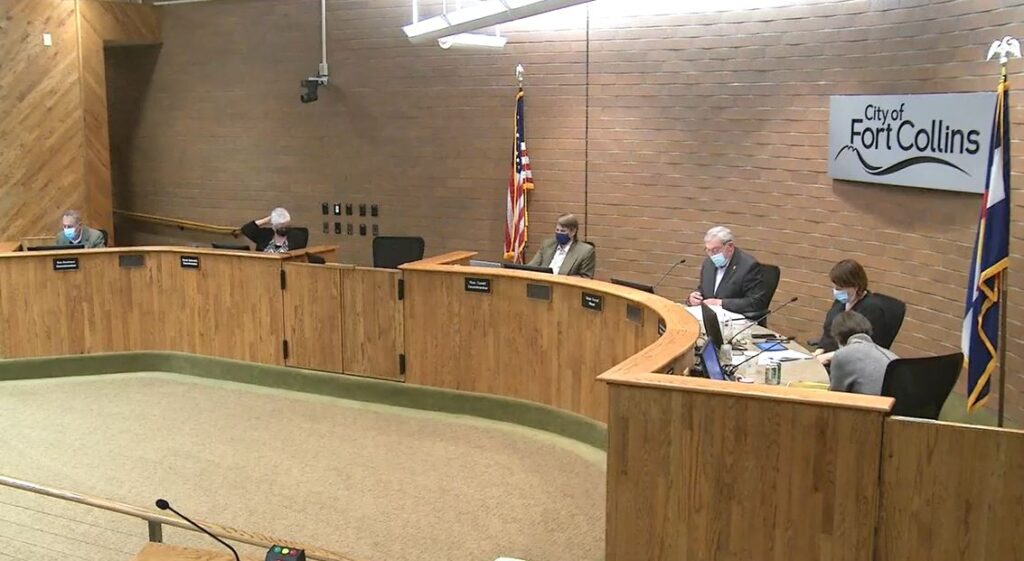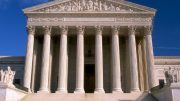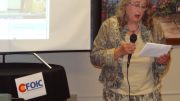By Jeffrey A. Roberts
CFOIC Executive Director
When the Fort Collins City Council went into an executive session Oct. 20, the announced purpose was to discuss “broadband issues,” a topic not expressly authorized in the Colorado Open Meetings Law for closed-door deliberations.
Fort Collins resident Eric Sutherland objected. “There is absolutely zero ambiguity in the state law as to whether or not you have the authority to do this or whether or not it is proscribed by the Colorado Revised Statutes,” he said during the public comment portion of the meeting. “… What you’re contemplating this evening is completely — completely — unlawful.”

The Colorado Freedom of Information Coalition asked Fort Collins City Attorney Carrie Daggett to explain the city council’s use of executive sessions to talk privately about the city’s new broadband utility, Fort Collins Connexion.
She pointed to a city charter amendment, approved by voters in 2017, that allows executive sessions “to consider matters pertaining to issues of competition in providing the telecommunication facilities and services … which shall include, without limitation, matters subject to negotiation, strategic planning, pricing, sales and marketing, development phasing and any other matter allowed under Colorado law.”
“As a general explanation,” Daggett told CFOIC in email, “the City’s authority stems from the powers granted to the City in the Colorado constitution as a home-rule city operating a municipal utility.”
The state open meetings law, aka the Sunshine Law, allows city councils and other local public bodies to meet behind closed doors for a limited number of discussion topics such as land transactions, personnel matters and negotiating positions as well as to receive legal advice from the public body’s attorney.
Neither the Colorado Supreme Court nor the Colorado Court of Appeals has ruled on whether a home-rule city can authorize additional topics for closed-door deliberations, according to Steve Zansberg, a First Amendment lawyer who is president of CFOIC’s board.
Zansberg said the interplay between a home-rule city’s charter and the open meetings law was last litigated at the district court level in a case brought against the city of Loveland by the Loveland Reporter-Herald. The newspaper successfully challenged the legality of city council executive sessions convened for the purpose of choosing an acting city manager.
In his 2011 ruling, Larimer County District Court Judge Devin Odell examined whether Loveland’s home-rule power supersedes the Colorado Sunshine Law, which declares “to be a matter of statewide concern and the policy of this state that the formation of public policy is public business and may not be conducted in secret.”
“As demonstrated by the plain language of this provision … the legislature included this declaration with the intent of overriding any home rule powers of municipalities with respect to open meetings,” Odell wrote, also noting that the legislature in 1991 amended the definition of “local public bodies” to specifically include home-rule cities.
Odell determined that the conduct of public meetings related to the city council’s appointment of city officials “is a matter of mixed state and local concern” governed by state law if a conflict exists. “… Given the lack of any clear constitutional mandate and the fact that the matter is essentially a policy issue, resting on values and beliefs regarding the operation of a democratic government, the Court finds that it must give considerable deference to the policy pronouncement set forth in the General Assembly’s declaration of statewide concern.”
District court rulings do not set judicial precedent. But if issues raised by the Fort Collins broadband utility are not limited exclusively to Fort Collins residents — meaning they are matters of both state and local concern — Zansberg said there is a strong argument” that the state open meetings law governs the city council’s meetings on that topic, “and it is not preempted by the city charter.”
“In the interest of reducing the potential for conflict over this issue,” Daggett said Fort Collins would like to see an open meetings law revision that expressly authorizes executive sessions to discuss telecommunications services. The city council expressed its support for such an amendment before the 2020 legislative session and will consider a similar resolution prior to the 2021 session, she said. But it’s not clear whether a bill will be introduced.
Sutherland told the city council the broadband utility is a matter of public interest that should be discussed in a public forum.
“The people of Fort Collins and the businesses of Fort Collins are on the hook to pay for the Connexion project if it should fail and, therefore, they have every bit as much a right to hear what is discussed in terms of competition with another carrier, progress on the project and whether or not this project will ever cash flow enough to repay the bonds,” he said. “This is all information that the public should be privy to, without any doubt.”
Follow the Colorado Freedom of Information Coalition on Twitter @CoFOIC. Like CFOIC’s Facebook page. Do you appreciate the information and resources provided by CFOIC? Please consider making a tax-deductible donation.




